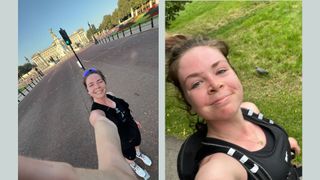I tried running 20 minutes a day to improve my fitness - here's what happened
Running 20 minutes a day can make all the difference if you're looking to improve your fitness and explore the mental health benefits of exercise, as Health Editor Grace Walsh discovered after a six-month daily routine


Can running 20 minutes a day make a difference to your health and wellbeing? It may not sound like a long time to some but simply adding in this simple workout to your routine every day can help you see amazing results in both your physical and mental health, as Health Editor Grace Walsh found after she picked up the routine for six months.
Over six months, I ran for 20 minutes a day. While I started running for the first time over two years ago now, I'd never been consistent with it, choosing to work out in the gym instead of pounding the pavement. I decided to change up my routine after finding that although I could lift heavy weights, I was out of breath when I ran for more than 10 minutes. Determined to make a change, I signed up for a half-marathon and started out the first few weeks of my training by running 20 minutes a day.
In just a short space of time, I discovered there are so many benefits of running to be had if you can make the sport part of your regular routine. Here, I reveal the results I experienced after my six-month running routine and, with the help of the experts, how to start running as a beginner.
Running 20 minutes a day results
1. Improves cardiovascular fitness
While I'd been working out for over two years consistently, strength training and doing HIIT classes, so I came into running with a baseline level of fitness, I could never have predicted the progress I'd make running 20 minutes a day. Within just a few weeks, I saw my fitness improve and I quickly went from feeling out of breath after 10 minutes of medium to slow-paced running to running a 5km in less than 30 minutes.
It's undoubtedly one of the best ways to improve your fitness, says Anya Culling, a LIRF-qualified coach who works with Runna, one of the best running apps around. Regardless of your current fitness levels though, running 20 minutes a day can make a real difference. "20 minutes for some might seem like a long time to run for, while others will see it as a jog in the park. But the truth is, it can help improve anyone's cardiovascular fitness," she says.
"It's a great goal for people starting out their running journey. For long-distance runners who train regularly, it might not be enough stimulus alone but it will get anyone's heart pumping, so running for 20 minutes a day will help your heart become more efficient, improve fitness, and prevent disease."

Anya Culling is a LIRF (Leadership in Running Fitness) qualified coach who works with Runna, a leading running training app. She is a Lululemon sponsored runner herself and has represented England over the marathon distance. After only taking up running properly in lockdown, Anya saw her marathon time on 4hrs 34 minutes skyrocket to a current personal best of 2hrs 34 minutes. She now has her sights set on the 2026 Commonwealth Games and loves coaching - living to show that anything is possible and it's never too late to start.
2. That 'feel good' feeling of Runner's High
Another key benefit of running 20 minutes a day I experienced was the elusive 'runner's high'. This, Culling explains, is a feeling "created by an interplay of endorphins - feel-good brain chemicals released when exercising - and endocannabinoids - neurotransmitters that are elevated in your bloodstream and create a sense of euphoria."
Sign up for the woman&home newsletter
Sign up to our free daily email for the latest royal and entertainment news, interesting opinion, expert advice on styling and beauty trends, and no-nonsense guides to the health and wellness questions you want answered.
For me, this feeling often comes at the end of the run during a sprint finish. I'd say you need to really push yourself physically to reach this 'high'-like state of mind, so it might be something you only find after a few weeks of running when you've built up a bit more endurance. It's one of the biggest motivators for getting out of the house when I'm feeling unmotivated or tired. While it only lasts a few seconds on the run, I find this rush of intense happy feelings dissipates slowly and even hours later, I tend to feel happier than I otherwise would.
It's a feeling that Culling herself can relate to. "Just 20 minutes makes me happier and more relaxed throughout the day," she tells me.
3. Improves focus
There's no rule to say that you can't run in the evenings or late at night but I found that running 20 minutes a day before work really helps to improve my concentration and focus. Whether it's the fresh air that comes with being outside early in the morning or the freedom of empty pavements, I just find my run tends to go better if I get it done earlier in the day and I go into work feeling zoned-in and able to concentrate - even before I've had my first coffee of the day. Wondering if you should exercise in the morning? Give it a go and see how it feels.
It's one of the results of running every day that you might be surprised by but it's very common. "It energises me [as well], ironically. I can start the run tired, lethargic and stressed, but after I feel more energised than when I started," agrees Culling. "Running gets your body moving. It's a full-body workout activating essentially every muscle group, which helps daily activities become easier. Plus, those endorphins make you feel more energised, positive, and confident in your abilities and appearance alike."
On the days where running in the mornings aren't an option, I do run in the evenings. If you only have time to run in the evenings or into the night, that's totally fine, but I'd recommend prioritising sleep after your run to experience the benefits the following morning. Exercise + good sleep = great concentration, I've found.
4. Better sleep
As well as needing good sleep to experience the benefits of running, running can help you sleep better. This is definitely something I found to be true after running 20 minutes a day for the last six months, as the physical effort of the run tires me out enough to fall asleep pretty much as soon as my head hits the pillow.
On the days I work from home, where I otherwise wouldn't be getting my steps in or spending much time in the fresh air (a natural sleep-inducer) at all, it's particularly beneficial.
"Running not only clears your head but it clears your lungs too, which is essential for a good night's sleep," explains Culling. "Plus, running during the day leads to an earlier release of melatonin, which is the hormone that regulates your sleep cycle."

It's important to incorporate different types of training into your routine when running 20 minutes a day.
5. Better recovery
Many experts actually don't recommend running every day due to the potential risk of injury faced by beginners who go from zero to 100 before their bodies are used to the pressure.
However, there's something to be said for the idea of little and often. For me, when I first started running, I did exactly this and attempted to take on 5km after 5km in longer and longer distances once a week or fortnight. While this was running less than every day, I found myself getting injured - with shin splints being the most painful outcome of them all.
In the last six months, I haven't felt anything more than sore muscles running 20 minutes a day, perhaps because it's not quite long enough to really be a huge stressor on my muscles.
Shorter runs are recommended by Culling as well if you're looking to run every day or a couple of times a week, at least when you're first starting out. "Shorter runs mean you are less likely to be injured than increased mileage or intensity following a rigid plan," she explains.
However, rest days are still important if you need them and everyone is different so don't follow a routine too rigidly if your body is suggesting you do otherwise. Whenever I've been ill or had a cold, I naturally let my running routine slip by for a day or too. In my opinion, his approach is best if you're looking to develop a long-term plan.
6. Forces you to incorporate variety into your runs
Running 20 minutes a day at the same pace along the same route gets very boring after a while. In traditional running training, many people split up their sessions into three: a long run, easy run, and intervals or some speed training of some kind. This not only helps to push the body in different ways, but varies up the training.
After feeling like my sessions were getting a little monotonous, I did exactly this. Of course I couldn't really include a long run as I was only out for 20 minutes a day, but I switched up the pace of three out of the seven runs I did almost every week.
Each week, I would do four runs at a good pace that I felt confident in but was pushing it - this is known as the 'threshold'. Depending on how I was feeling, the other three runs would be divided up into one or two easy runs - where I would move a lot slower than normal - and one or two speed-style sessions. For me, I'd often do some interval training on this day/days, where I'd run at a strong, fast pace above my threshold level for two minutes, then run slower for three minutes, repeating the cycle until I hit my 20 minutes.
"Variety is hugely important in your training you are trying to get to the next level," says Culling. "You can run 20 minutes a day in thousands of different ways."
Here are a couple of training styles you could incorporate into your routine:
- Recovery run at a slow pace
- Interval training: one minute fast, one minute jog
- Hill sprints
- Fartlek training: Random variations in speed and intensity over the course of your run
The bottom line: Will running 20 minutes a day make a difference?
Yes, absolutely. At the end of the day, running is good for you. Whether you're looking to run to clear your mind or improve your fitness, any running is better than no running at all and 20 minutes a day is more than enough to help you see progress in your short-term health.
Several studies, including one from Iowa State University, point to the idea that even running for short periods of time every day can have major physical health benefits. As the study reveals, even just five to 10 minutes per day at slow speeds was associated with a significantly reduced risk of death from all causes and cardiovascular disease.
If you only have one pair of running shoes though, it's worth learning how to clean running trainers or investing in a second pair if you can as they can take a hit when you're running every day.
From a mental health standpoint, there are specific studies from the University of Boston Medical School looking at the effects of running for 20 minutes three times a week on those with diagnosed depression. The researchers found no difference in the outcomes after 10 weeks between the running group, the group who met with a therapist for an hour a week, and those who did a paired-back combination of both, and the outcome was the same even four months later.
When compared with other treatments for depression, including psychotherapy and pharmaceutical intervention, exercise was found in this study to be just as beneficial.
This shouldn't be taken as a one-size-fits-all approach though as it won't be suitable for everyone. If you are struggling with your mental health, it's best to speak to a professional such as your general practitioner for guidance.

Is 20 minutes exercise a day enough to lose weight?
If you're looking to lose weight healthily then running for weight loss could help you in that process. It's essential to be in a calorie deficit to lose weight and when many people enter this, they find combining more daily movement with dietary changes to be the best way forward.
A calorie deficit is all about burning more calories than you consume every day. Not all of this calorie burn comes from exercise - on average women burn about 1800 calories in a day just through regular activities like sitting, sleeping, breathing, and even eating, per the NHS Eatwell Guide - but exercise can boost this burn, and help you lose weight.
How many calories does running burn? That'll depend on a number of factors including your starting weight, age, gender, and other lifstyle factors, but it's one of the top calorie-burning exercises out there since it's a high-intensity, full-body workout.
Tips for running every day
- Start slow: They say the key to running fast is to run slow and Culling agrees. "Your body needs to get used to the movement so running, a walk-to-run alternating plan is a great way to split the 20 minutes up. For example, you could run for one minute, walk for two minutes and repeat," she says.
- Trust the process: Running 20 minutes a day is going to be challenging to begin with, especially if you're not used to running a lot but it does get easier. Soon you could find yourself running 30 minutes a day. "Trust the process and stay consistent, as your fitness increases, running for longer or at a faster pace will feel more comfortable," says the coach.
- Buy a good pair of running shoes: "Ensure you have the right running shoes for you," says Culling. "Not only do you want to feel good when running but a well-fitting, appropriate shoe will help reduce the risk of injury." And don't forget other running gear like a good sports bra, and a pair of the best leggings or running shorts.
- Listen to your body: Most importantly, if you run for 20 minutes a day and you feel yourself experiencing exercise burnout of sorts, give yourself a break. It's better to run 20 minutes every other day or even just once a week to begin with than to risk injury and not be able to run at all. "You have got to see what works for you," warns the coach. "However you do it, it's beneficial for your health and wellbeing. Check-in with your body on how it's feeling. You might be able to push the pace quicker one day but need to recover or rest another. Not one running shoe fits all."

Grace Walsh is woman&home's Health Channel Editor, working across the areas of fitness, nutrition, sleep, mental health, relationships, and sex. She is also a qualified fitness instructor. In 2024, she will be taking on her second marathon in Rome, cycling from Manchester to London (350km) for charity, and qualifying as a certified personal trainer and nutrition coach.
A digital journalist with over six years experience as a writer and editor for UK publications, Grace has covered (almost) everything in the world of health and wellbeing with bylines in Cosmopolitan, Red, The i Paper, GoodtoKnow, and more.
-
 Help yourself grow: methods to boost your self-esteem overnight
Help yourself grow: methods to boost your self-esteem overnightFrom the outside to the inside, these everyday tips, tricks and techniques can help you boost your confidence and grow your self-esteem
By Jack Slater Published
-
 Don't love overly Christmassy nails? These black manicures are chic *and* subtly festive
Don't love overly Christmassy nails? These black manicures are chic *and* subtly festiveIf the idea of glittery, tinsel red nails makes you shudder, these sleek black manicures will help you mark the season in style...
By Naomi Jamieson Published